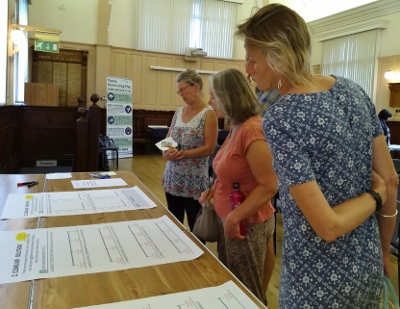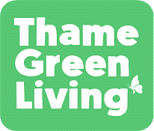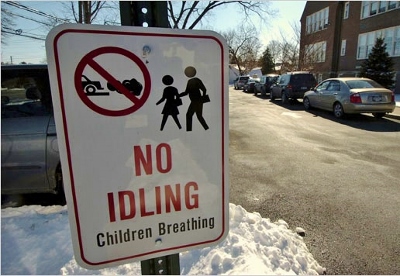Let’s clean up Thame’s air!
On 13/07/2019 At 1:23 am
Category : Missed a ThameNews story?, More News, Thame news
Responses : No Comments
AROUND 60 people took part in a Clean Air Forum on Wednesday, July 12, hosted by the Thame Green Living Group (GLP), as a follow up to the recent public consultation on a Green Living Plan for the town.
“We are taking as read that there is a Climate Emergency,” said the Chair, Charles Boundy, as he explained that the group was now thinking about practical ideas to move forward, looking at the three topics with most engagement from the consultation, clean air, clean energy and Electric vehicles.
Fellow group member, John Scott explained that there may need to be trade offs between quick wins and those which would take longer. All these topics, he said, were being looked at by OCC, SODC, the government and governments all over the world and the GLP is tapping into what is going on in these places and staying in step.
Practical steps
John told the audience that among the practical ideas being considered by the Green Living group are promoting cleaner vehicles; support for a ‘no idling’ campaign; installing electric vehicle charging points – thinking about where they should go – car parks? Charging point hubs? Where there is no off street parking?; holding an EV test drive day; a community-funded clean energy generation scheme – a solar array? a wind farm? Such things are happening elsewhere across Oxfordshire, he said.
Charles Boundy then spoke about clean air, reminding the audience that it is 13 years since Al Gore’s film, ‘An Inconvenient Truth’ and how David Attenborough’s documentary, Blue Planet, had been a turning point for our awareness of plastic pollution of the seas, and the effects of rising sea temperatures.
He used the analogy of our ‘sea’ being the air we breath, and it now being full of debris in the same way, but the difference being, we can’t see it!
“What goes up contributes to climate change,” he said. “Burning fossil fuels for instance contributes to melting ice-caps, etc. And what comes down causes air pollution, and its proven adverse effects on health. It’s like breathing asbestos over a period of time.”
‘We are damaging the most vulnerable’
Charles explained that, although here in Thame there may not appear to be such a big problem of air pollution as in other places, there is no safe level. Queueing traffic, vehicles idling outside banks, shops, take-aways etc are a problem. “The worst place of all,” he said, “is at the school gates where we are damaging the most vulnerable. Some people don’t realise that that the pollution inside an idling car is four times that of the air outside.” Walking and cycling is much safer, he said.
Will it get worse?
With more houses, more cars and more journeys, if we don’t act, the situation will only get worse, suggested Charles.
A Clean Air Week is being planned in Thame, in October, for which the Green Living Group would like more volunteers to help.
Charles then questioned why there were not more people there at the forum, an indication, he said, that the Green Living Group needed to do more about communication. He questioned whether there were some people who did not want to change, didn’t believe the evidence or expected others to take action. “It is not just down to the council,” he said. “It is not just their job to do want we want.” It was up to the affluent areas of the world to take the lead, he suggested, and show the way.
Why should we change?
If we don’t, suggested Charles, “…we’ll become victims through our own inertia – there is no going back.”
Some of the practical things people could do, he suggested, were to support SODC’s ‘Turn it off’ campaign, and think to ourselves, ‘Do we need to use the car? Can I walk or cycle? Another suggestion was to consider making your second car an EV.
“We need to change the ‘THEY’ need to make changes, to ‘WE’ and the ‘WE’ to ‘I'” he concluded.
Bigger Choices
Charles suggested that we will all have to change our priorities. “When did we surrender our roads to cars?” he asked, and suggested that it was time to change our priorities, adding: “Thame is an active and attractive town and we must balance accessibility and vibrancy with health. We all need to consume less, but perhaps most importantly, we need to start by slowing down our pace of life so that we can make more time to travel, and to live more sustainably.”
Questions from the floor
A resident asked about people’s experience of asking drivers to turn off their ignition when they were sitting in their cars with the engine idling. Some nervousness was admitted to, but there were examples of ways of approaching such drivers, with a gentle, polite message and in one case, by children offering drivers a chocolate to turn off their engine!
Another resident pointed out that to be more effective ‘a holistic approach’ needed to be taken to planning change, because, for instance, older people and the disabled may not be able to walk or cycle into town.
‘Climate anxiety’ and the need to come together
Many young people are suffering from ‘Climate Anxiety’ said one resident, which suggested, she thought, that there was a need for everyone to come together and create a feeling of community and togetherness to take actions for the benefit of all.
Following the presentations and questions, members of the audience were invited to stick blue stickers on various charts focusing on clean air, clean energy and Electric vehicles, to indicate their considered level of feasibility and neccessity against suggested actions. Afterwards, a quick assessment was made of the results by members of the Green Living Group, Mark Stockley, Phil Evans and Lisa, indicating the following:
* Just how much the people in Thame really do care about clean air
* How popular the idea of micro-transport, i.e. an electric hopper bus, is
* The popularity of experimenting with pedestrianisation of the town centre
* Need to help people who are older and/or cash-strapped, to engage
* That there was some way to go to establish the effectiveness of electric
vehicles
Solar energy
It was pointed out that there is a large solar array just outside Thame, visible from the train. John Scott said that he was aware that it supplies enough electricity to power a town the size of Thame. He added that contact was being made with the owner to share real-time data from the array. He added that although the government had stopped the advantageous ‘feed in’ tarifs, it was his understanding that it had promised introducing ‘an export tariff’ by the end of the year. John added that there are already incentives for businesses to use green energy, and that free ‘energy audits’ are available for businesses to help them to work out how much energy they are using and how they could reduce it. A town councillor who was present said that he would take this information to the business community of Thame.
There was some discussion about solar panels on the roofs of houses, and the concern some people have about the ascetics of the panels. It was pointed out that there are now black roofs with black solar panels available that are easier on the eye, and ‘solar slates’ that are now available.
A questioner asked if the new houses in Thame had solar panels or heat pumps. The answer was ‘No’.
The results of the blue sticker exercise and the points raised by the forum will be analysed by the group before it puts forward further actions.
After the meeting, Charles Boundy said: “The evening was good progress to gathering views and choosing options and we’ll be coming back to people shortly on the main headings.”
The learn more about the Thame Green Living Group, or to volunteer, visit the website: https://www.thamegreenliving.org.uk/
To learn more about RSA Thame group, the Independent Consultants behind the GLP on behalf of Thame Town Council, link HERE




